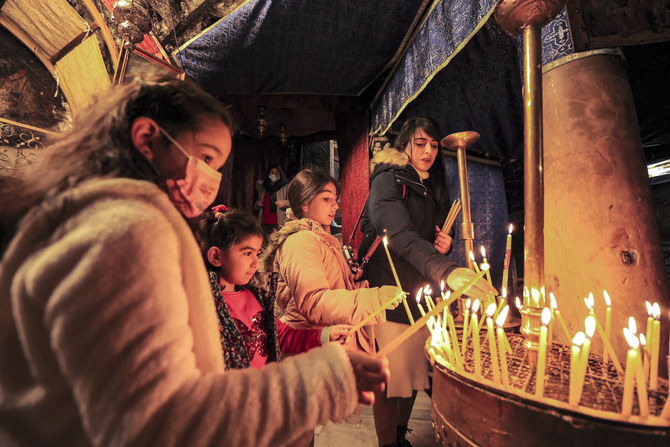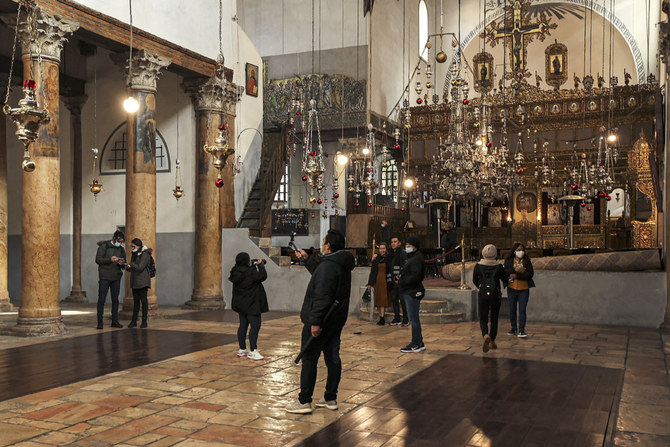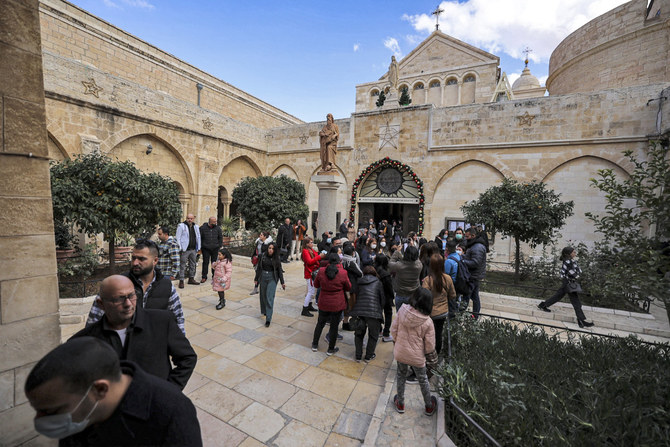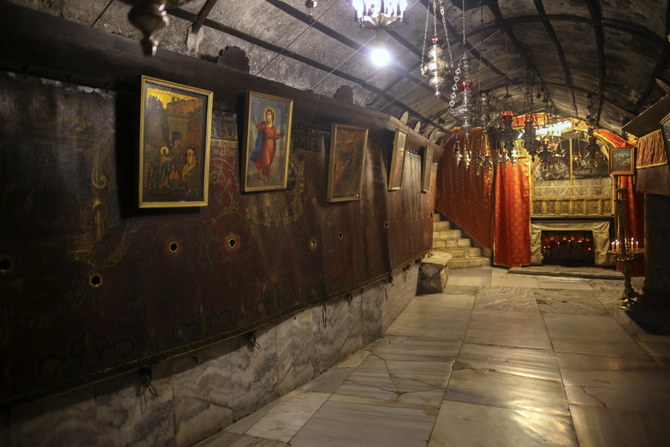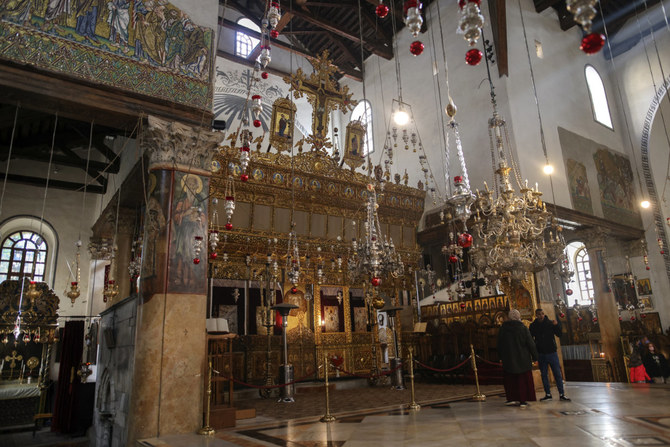AMMAN: Years of meticulous restoration work at the Church of the Nativity in the West Bank city of Bethlehem have uncovered a precious trove of previously undiscovered artworks, relics and artifacts dating back centuries.
Christians believe Jesus Christ was born at the site where the church now stands — an event that is celebrated every year on Dec. 25. As such, Bethlehem and the church itself are considered places of pilgrimage by Christians the world over.
The COVID-19 pandemic may have reduced the long lines of pilgrims and tourists to a trickle over the past two years, but those fortunate enough to attend will have noticed significant changes at the site since renovations began.

Christians believe the grotto of the Church of the Nativity to be the place where Jesus Christ was born. (Supplied)
Inscribed on the UNESCO World Heritage List in 2012, a church was first completed at the site in 339. The edifice that replaced it after a fire in the sixth century retains elaborate floor mosaics from the original building.
Thanks to several years of sensitive restoration work, many hidden details have been revealed for the first time in centuries, including original stonework, detailed ornamentation and precious objects lost to time.
Renovation work began in 2013 after a generous donation from Palestinian philanthropist Said Khoury, who during a visit noticed that rainwater was seeping into the church through its deteriorating roof.
Determined to do something to protect the site, Khoury, then chairman of the Athens-based Consolidated Contractors Company (CCC), met with Palestinian President Mahmoud Abbas to discuss the matter and donated half a million dollars to kick-start the restoration.
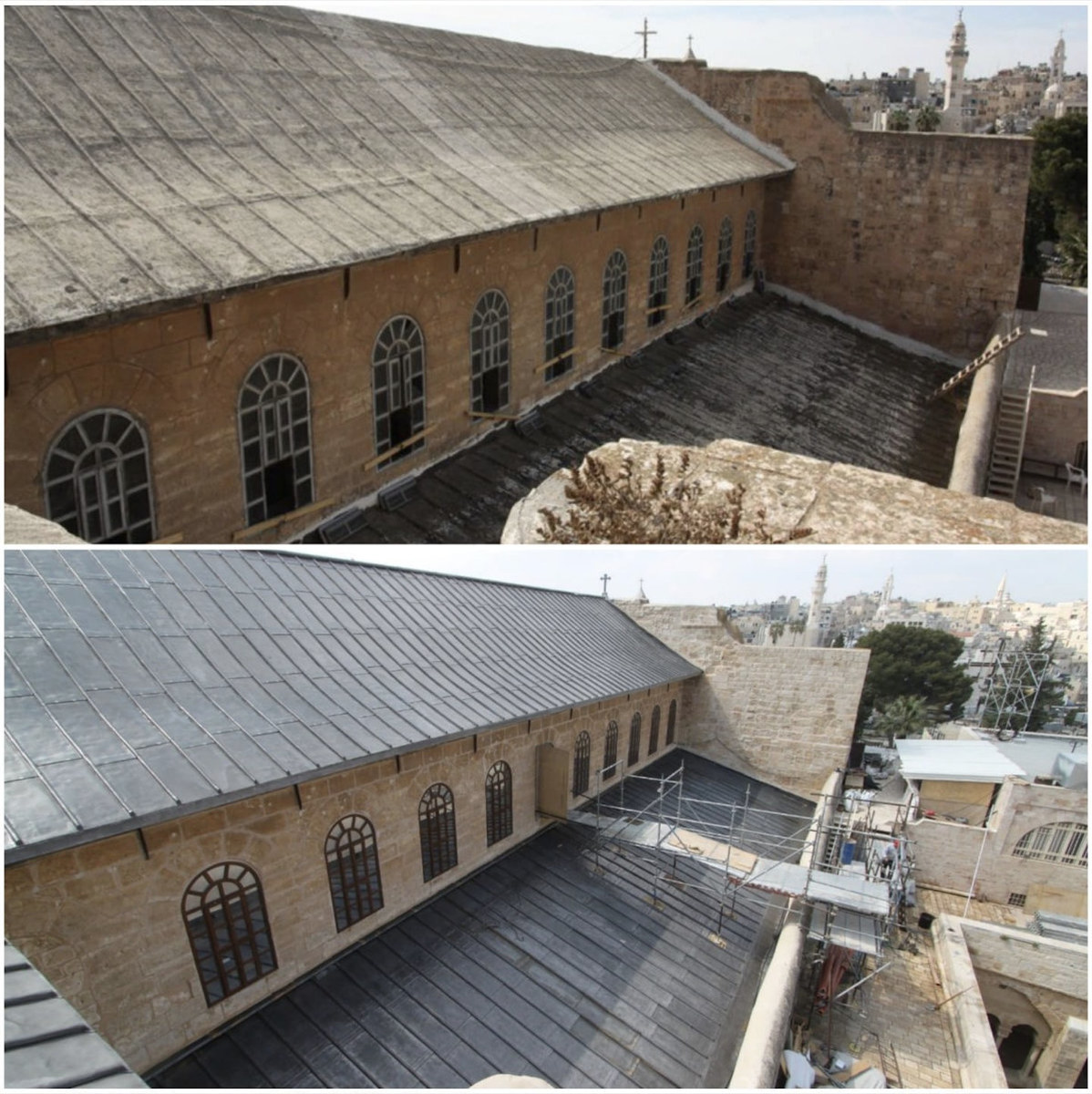
Restoration work was made possible by donations from around the world. (Supplied)
The Presidential Committee for the Restoration of the Church of Nativity was established and, before long, donations to support the renovation were flooding in from around the world.
An international tender was made with the help of CCC to ensure the renovation work was carried out to the highest standards in order to protect the church’s World Heritage status.
“The Italian firm that won the tender, Piacenti, are expert restorers for three generations and they carried out the work according to the specifications that were dictated by UNESCO,” Mazen Karam, CEO of the Bethlehem Development Foundation, told Arab News.
Karam and his foundation colleagues, who raise funds and supervise the renovation work, are thrilled with the number of new discoveries that have been made over the course of the restoration. These included a beautiful, hand-crafted glass lamp.
The restoration team also discovered a baptismal font hidden under a layer of marble, and uncovered an angel on the northern wall of the basilica, which had been covered with plaster.
“The angel is just one of the many surprise discoveries that we have seen in the church once the renovation process began,” said Karam.
Another big surprise was the discovery of the building’s original door, now faithfully restored, which is believed to have been gifted to the church by an Armenian king.
Tour guides encourage visitors to see the church after dark from the direction of Manger Square to experience the full effect of the new lighting installed among its restored walls.
On entering the church, visitors pass through the Door of Humility — a stone entrance that was deliberately built with a low ceiling that forces worshippers to bow in reverence.
Once inside, visitors can fully appreciate the tireless effort that has gone into restoring the lofty ceilings, pillars, walls and paintings.
Perhaps most importantly, the restoration has halted the scourge of rain damage. The last time the roof underwent major repairs was in 1480 during the Mamluk period. “Now we can say with confidence that the ceiling will be good for another 1,000 years,” Karam said.
During the repairs, the whole roof was covered with 1,625 square meters of new lead sheeting and around 8 percent of its wooden trusses replaced with ancient wood brought from Italy, reinforced with steel connectors to protect the basilica from seismic activity.
FASTFACTS
The church roof last underwent major repairs in 1480 during the Mamluk period.
UNESCO removed the church from its List of World Heritage in Danger in 2019.
Restoration to date has cost around $15m, but a further $2.8m is needed.
All 42 of the church’s wooden window frames were replaced and fitted with UV-deflecting double glazing. About 3,365 square meters of internal plastering, 3,076 square meters of external stone facades, and 125 square meters of wall mosaics were renovated, consolidated and cleaned, while 50 stone columns were restored and repainted.
Such was the success and quality of the restoration work that UNESCO removed the Church of the Nativity from the List of World Heritage in Danger in 2019.
The Bethlehem Development Foundation said it was particularly grateful for the “extremely professional and respectful” support of the presidential committee and the Palestinian government, which ensured that resources and expertise were made available.
To date, the restoration work has cost around $15 million. However, the repairs are not yet complete, and an estimated $2 million in additional funding will be needed to finish this phase of the project.
Work completed to date includes the restoration of the sixth-century marble tiles for the Bema in front of the Orthodox Iconostasis and transept south.
Projects yet to be funded include the conservation of the front-yard stone tiles, the installation of a firefighting system and microclimate controls, structural consolidation at the north and south corners of the basilica, the consolidation of its external southern wall against seismic activity, and the restoration of the central nave.
Perhaps the most sensitive portion of the church that remains to be refurbished is the Grotto of the Nativity, a subterranean space where Christians believe Jesus was born. The precise spot is marked by a silver star.
The foundation said that the grotto is in urgent need of repairs, which will cost an estimated $2.8 million, having suffered centuries of earthquakes, fires, and the wear and tear of hosting millions of visitors.
However, the issue is not entirely a question of money. Given its religious significance, any work on the grotto must first be approved by the three churches that guard the site — Orthodox, Catholic and Armenian.
Restoration of the site could also deny pilgrims and tourists access to the grotto for up to eight months.
“The grotto will require a number of things before we can begin working on it,” the foundation told Arab News. “We need the approval of the three churches and we expect that this will require a further $2.8 million and will require that all works, including the grotto, can be completed by 2023 if the needed funding is secured.”
One solution the churches, Bethlehem municipality and the Palestinian Ministry of Tourism would like to see is a phased restoration that allows for scheduled prayer and some visits to the grotto.
Karam said that this approach will allow the Church of the Nativity to remain both a place of worship and a site of historical curiosity to people of all faiths and denominations while it undergoes repairs.
“Your visit will help keep it alive as a testimony to the living church and will prevent it from turning into a museum,” he said.


